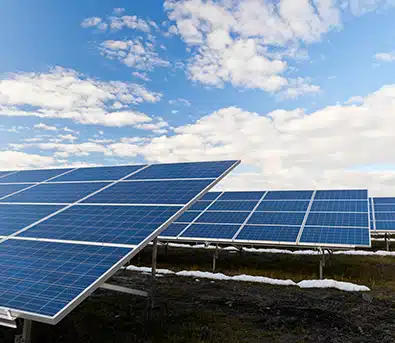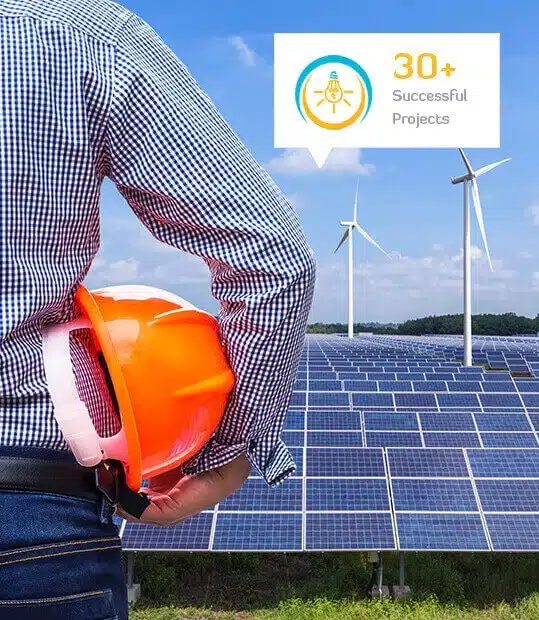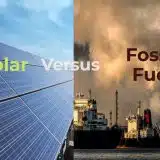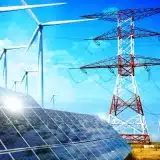Solar energy is the energy created by the nuclear fusion that takes place in the sun. It is harvested by solar panels for human uses such as electricity.
Solar panels convert the sun’s light into usable solar energy by absorbing sunlight and allowing electrons to flow through the material to produce electricity.
This process of converting light (photons) to electricity (voltage) is called the photovoltaic (PV) effect.
What is Solar Energy Used For?
Small Energy Bill uses solar energy technologies to harness the sun’s energy and light to provide heat, light, hot water, electricity and even cooling, for both residential and commercial applications.
The main solar technologies that we use are:
1. Photovoltaics generate electricity directly from sunlight through an electronic process. The power produced can be used to power anything in your home or business.
The solar PV cells are made from layers of semiconducting material, usually silicon. When light shines on the material, electrons are knocked loose, creating a flow of electricity.
The cells don’t need direct sunlight to work, they can work on a cloudy day. However, the stronger the sunshine, the more electricity will be generated. These PV cells are usually grouped into modules, which are also grouped into solar arrays.
With Small Energy Bill, you can opt to install these PV cells on your roof or on the ground. We include inverters in the installation of solar PV systems to convert direct current (DC) electricity to alternating current (AC). The DC is the electricity generated from the PV system and the AC is the electricity that your appliances will use.
2. Solar heating and cooling use the heat generated by the sun to provide space or water heating in the case of solar heating and cooling systems.
The solar water heating panels that we install can provide up to 50% of your building’s hot water demands. We will make sure that you will spend less on heating your water with a quality solar water heating system.
3. Solar tiles and slates are designed to be used in place of ordinary tile roofs. We install this type of solar system if aesthetics are important to you. They will typically cost about twice as much as an equivalent solar panel system. They are not as cost-effective as solar PV systems, but they are considered appropriate if it’s what you desire for your roof.
What are the 4 Main Types of Solar Energy?
Solar energy is generally used to refer to the method of collecting light and turning it directly into a useful form of energy.
The 4 main types of solar energy are:
1. The passive solar gain is obtained when sunlight enters a building through windows and warms the inside.
2. Solar thermal where a black surface that absorbs light heat up and transfers the heat into a working fluid. The working fluid moves the heat to places where it is needed like a swimming pool and faucets inside the building that need hot or warm water.
3. Concentrated solar power where the sun’s rays are concentrated by mirrors to create much higher temperatures to heat oil that in turn heats water and makes high-pressure steam that can drive a turbine and generate electricity.
4. Photovoltaic solar converts light directly into electricity, as mentioned earlier. We install the best PV systems in the industry that can compete with the retail cost of electricity.
Solar Energy Pros and Cons
You may still be wondering if solar is right for you.
Let’s look at the upsides and downsides of a solar panel system to help you make a better-informed decision.
Benefits of Solar Electricity
- Cut your electricity bills. With solar, you are harnessing energy from a free source—the sun! Once you have paid for the initial installation of your system, your energy costs will be significantly reduced.
- Reduce your carbon footprint. Our solar panel systems allow you to use green, renewable energy that will cut how much carbon you produce. A typical home solar PV system, for example, could save you around 1.3 to 1.6 tons of carbon per year.
- Diverse applications. With Small Energy Bill, you can choose what types of solar energy systems you want to be installed for your home or business. The electricity generated by your system can be used for diverse applications.
- Low maintenance costs. The solar panel systems we install will need very minimal maintenance to keep them functional and efficient. All you need to do is to keep them clean. We can also provide maintenance services for your system if you prefer so.
Disadvantages of Solar Energy
- High Initial Cost. When you plan to install a solar energy system, expect to spend for its initial cost of installation and materials. It will be fairly high because it includes the cost of the panels, inverter, batteries, wiring, and installation.
- Weather-dependent. The efficiency of solar panels decreases during cloudy and outcast days. You will notice the effect of cloudy and rainy days on the effectiveness of your solar energy system.
- Expensive solar energy storage. When you opt for an off-the-grid solar system, you will have to purchase solar batteries where the excess electricity generated by your system will be stored. You can then use the stored energy during the night and on days when the weather is not favorable for solar.
- Consumes a lot of space. Depending on the energy needs of your home or business, you will need ample space to accommodate all the solar panels to collect as much sunlight as possible. If the space on your roof is not enough, you will need extra space on the ground.
The Best Solar Panels For Your Home and Business
Now that you know what solar energy is, we hope we have sparked your interest in the turn-key renewable energy solution of solar that will surely deliver financial savings, carbon reductions, and energy independence for you.
Small Energy Bill is your partner in this worthwhile goal. We install the best solar panels in all states. Contact us now!


























